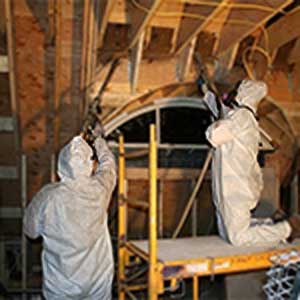We’re here for you around the clock, ensuring that help is always within reach, especially during critical fire and flooding emergencies.

Our team’s experience spans both residential and commercial jobs, showcasing our ability to manage projects of any scale effectively.

From water damage and fire & smoke damage to air duct cleaning and biohazard cleanup, we bring your property back to its pre-disaster state.
Winter Water Damage: 8 Suggestions For California Homes
Despite California’s good weather, it is vital to prepare and winterize your home and property to avoid plumbing problems that can lead to winter water damage. Irregular freezing temperatures and heavy storms can cause problems from brown rot and leaky roofs to damaged water pipes and crawl space flooding.
California has surprisingly impressive weather throughout the year, particularly in the southern part. It has mild and wet winters, yet freezing temperatures are not frequent. However, despite the good weather, preparing and winterizing your home and property is vital to avoid plumbing problems that can lead to winter water damage. Irregular freezing temperatures and heavy storms can cause problems from brown rot and leaky roofs to damaged water pipes and crawl space flooding.
Prepare & Protect Your Home From Winter Water Damage
Preparing and protecting your home during this winter is crucial. Check out the following suggestions and precautions. Some plumbing problems are often undetected and might result in water damage.
1. Insulate Pipes
This is often overlooked because the weather here in Southern California is pretty good. However, it doesn’t mean that temperatures will never get below the freezing point. Water pipes exposed to external walls or non-heated spaces can freeze, burst, and flood a property or a building. So, prepare and protect your pipes with insulation to prevent damage and expensive repairs.
2. Seal Your Home
Make sure to seal your home before winter. Check crawl spaces and attics for proper insulation and close all entry points. Also, check the caulking around your doors and windows. Seal all noticeable gaps and cracks with caulking. This helps maintain the temperature in your home and prevents cold air from coming into contact with your pipes.
3. Check & Clean Your Drainage
Regularly clean your drainage. Clear out gutters and downspouts to prevent clogs and overflow during heavy rains. Make sure your home has adequate drainage by checking that all gutter downspouts drain at least five feet away from your home. This will prevent water from flooding around your home and damaging your foundation.
4. Check & Maintain Water Heater
Tank storage and tankless water heaters must be maintained yearly, including draining and flushing several times. Also, check the heating mechanisms and maintain hot water, especially in cooler months. You can consult a professional for water heater services.
5. Clean Window Tracks
Window tracks hold your windows in place and keep out breezes. They have weep holes that allow rainwater to drain out during heavy rains. However, dust and dirt accumulate fast and block the weep holes, leading to filling with water and eventually water damage. Cleaning all your window tracks before the rainy season is essential to prevent this.
6. Inspect & Trim Trees
Leaves and tree branches can cause many problems during stormy weather, such as clogged gutters and roof damage. Check the distance between tree limbs and your roof. Keep insects and rodents from accessing your roof by trimming the limbs. If trees are maintained well, safety concerns like falling branches are reduced.
7. Clean & Check Your Roof
Before winter sets in, it is essential to check the condition of your roof. Clean the roof by clearing leaves, twigs, and other debris. Check the roof’s shingles and other waterproofing parts, like the seals and flashings around pipes, vents, chimneys, and skylights. Rubber seals and caulking wear out prematurely, especially in summer. Replace any parts if needed.
8. Change Your Irrigation Timer
Adjust the settings on your irrigation timer to avoid water waste before winter sets in. It’s uncertain how much rainfall will occur, so turning the water off completely is not always wise. One good solution is adding rain sensors to the irrigation system to cue the timer to delay following rain.
Dealing With Water Damage? Contact A Pro
Do you need our help? Water damage is often a headache for homeowners. Superior Flood and Fire Restoration has dedicated and trained staff to provide 24/7 water damage restoration services and ease your worries, especially this winter!
Please don’t hesitate to contact our local office, Water Damage San Jacinto.



